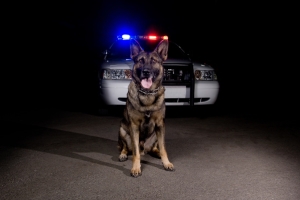New law will allow EMTs to help K-9s

The New Hampshire Legislature recently passed a bill that will allow emergency services personnel to treat and transport police dogs.
This new law is inspired by the story of Nero, a Massachusetts K-9 that was shot in the face while serving an arrest warrant in Barnstable in 2018. While there were multiple ambulances on site, none could legally help or transport Nero. A senior law enforcement officer made the decision to place Nero in the back seat of his cruiser and find a vet. During the ride a doctor from the SWAT team intubated Nero with a drinking straw. Nero survived that day, although his injuries forced an early retirement.
Sargent Sean Gannon, Nero’s handler, did not survive. The same man who shot Nero took Sgt. Gannon’s life.
Sgt. Gannon’s parents, Patrick and Denise Gannon, have honored their son’s memory by lobbying for state laws that allow EMTs to treat and transport police canines. Massachusetts passed Nero’s Law last year. This year the Gannons worked with Sen. Lou D’Allesandro (D-Manchester) and other New Hampshire senators to pass a similar law in New Hampshire. That bill is named Max’s Law, honoring a Portsmouth police dog that was killed in a training accident.
Members of New Hampshire law enforcement, emergency services, and the veterinary community showed up at both the House and Senate public hearings to testify in favor of Max’s Law. They spoke to how police dogs save lives, heading into danger before their human partners. However, there are no veterinary first responders to treat these canines in the field. In rural areas, veterinary treatment may be even farther from the scene.
Sen. Bill Gannon (R-Sandown) spoke in favor of Max’s Law on the Senate floor. “We owe it to these dogs in blue to provide them with every possible chance to survive,” he said, “and this legislation is going to give them that chance.”
There was overwhelming support for Max’s Law before the New Hampshire Legislature, but some questions remain. While EMTs may be able to provide basic care to a K-9, neither they nor K-9 handlers are likely to have training in K-9 first aid. Massachusetts, in contrast, has a new requirement for EMTs to complete training in basic life support for dogs.
During the public hearing in the New Hampshire Senate, there was also some discussion over whether the law should cover comfort dogs. While some New Hampshire police K-9 units include comfort dogs, those dogs may not be trained to face hazardous situations. The final text of Max’s Law explicitly includes comfort dogs.
Max’s Law also includes several important exceptions. Emergency services cannot treat or transport a canine if a human needs help. The animal must also be injured in the course of their official duties. The law also protects emergency medical services units from liability if they choose to treat or transport an animal.
Max’s Law is now waiting for a signature from Gov. Chris Sununu.











Comments
Login or register to post comments